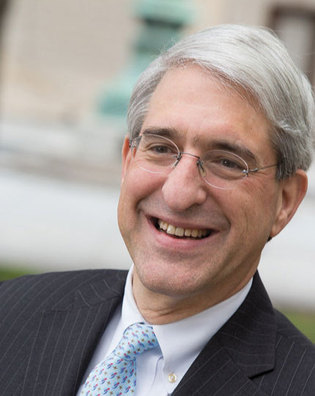
Mark Ostow
In this issue, Salovey talks about his latest trip to Davos in January.
View full image
Y: Why do Yale presidents attend the World Economic Forum every year in Davos, Switzerland?
S: Yale has been represented in Davos for many years, in part because [former] President Levin [’74PhD] is an economist, and the forum started as an economics conference. But it has grown into a major venue for thinking about policy from an international perspective—and about the future, increasingly, from a kind of techie perspective. It brings together what the director of the forum would call “relevant stakeholders”: leaders in industry, government, academia, and nonprofits and other NGOs. There aren’t too many places where that can happen.
Y: What’s the advantage to Yale?
S: I go to Davos with five goals. The first is to participate in the Global University Leaders Forum (GULF)—a group of 25 heads of research universities from around the world, chaired by President Tan Chorh Chuan of the National University of Singapore. Of the three days I spend in Davos, one is substantially taken up with GULF, and it is time incredibly well spent. This year, for example, we discussed ways for universities and industry to collaborate on research—which models work best, how to avoid conflicts of interest, how to make such collaborations scientifically successful.
The second is to promote the research and scholarship of our faculty to a global audience. At this year’s forum, we focused many of Yale’s events on protecting and preserving cultural heritage, and particularly the inspiring interdisciplinary work of the Institute for the Preservation of Cultural Heritage at Yale’s West Campus. In April, we will host the UN Global Colloquium of University Presidents, which will showcase Yale’s ability to use its breadth of research and scholarship to address global issues like the preservation of cultural heritage.
Third, at Davos I spend a lot of time meeting with our alumni, students’ parents, and potential friends of the university. Some of that is in a development context; some is just creating community and, potentially, visits to Yale by very interesting people.
My fourth objective is to generate positive media for Yale. I participated in numerous interviews. Virtually every major media outlet covers the forum.
And finally, the last objective is a fringe benefit: the ability to network on behalf of the university with very interesting people from all parts of the world in all sectors, to interest them in Yale.
Y: What was most interesting this time around?
S: I had the chance to speak with some really fascinating people I had never met before—for instance, Christine Lagarde, the managing director of the International Monetary Fund, talked with me about her challenges with the economics of Europe.
Also eye-catching this year was the intense focus on rapid change in technology. And for the first time I heard, not an unmitigated celebration of technological wizardry, but some questioning of the assumptions that the technological wizards are making. For example, I was asked to moderate a panel on the role of human insight and emotional intelligence in a world of big data and artificial intelligence.
Y: I’ve heard that you can tell you’ve made it to the best party if you see the Clintons arrive.
S: I have not run into the Clintons at Davos, but you cannot be at Davos and not run into heads of state. I did spend time at a reception with Yale’s own John Kerry [’66], who is always fascinating. Although considerable media attention is focused on celebrity sightings, my experience at Davos is of very thoughtful people grappling with the issues of our day. Maybe it’s the case that university presidents don’t get invited to parties with celebrities, but I readily admit this is in no way disappointing to me!
 loading
loading